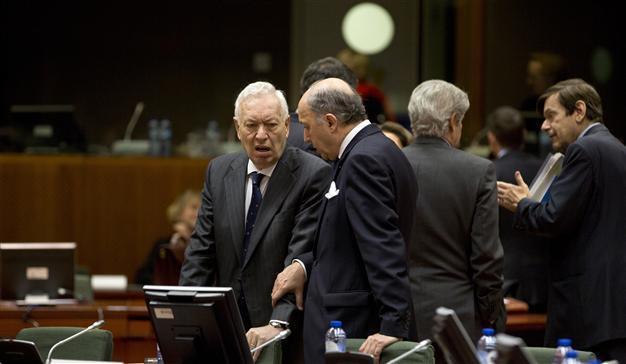EU agrees to suspend visa talks with Russia: Draft statement
BRUSSELS - Agence France-Presse

French Foreign Minister Laurent Fabius (C) puts his hand on the arm of Spanish counterpart Jose Manuel Garcia-Margallo during an emergency meeting of EU foreign ministers at the EU Council building in Brussels, March 3. AP Photo
European Union foreign ministers have agreed to suspend talks with Moscow on visa issues after Russia's seizure of Crimea, a draft of a statement to be issued later on March 3 said.Russia and the European Union have been discussing visa cooperation since 2007, with Russia keen to have visa-free access to the EU's member states.
"The EU has decided to suspend bilateral talks with Russian authorities on visa matters, as well as on the new agreement," a draft of statement to be issued by EU foreign ministers said.
The key issue was raised at nearly every meeting between Moscow and Brussels.
Earlier, German Foreign Minister Frank-Walter Steinmeier described the crisis in Ukraine as "the worst in Europe since the fall of the Berlin Wall."
Russia's intervention means "the threat of a division of Europe is real again," Steinmeier said ahead of the emergency meeting, adding that diplomacy is now essential to avoid military escalation.
"But now is time for diplomacy. Diplomacy does not mean weakness but is more needed than ever to prevent us from being drawn into the abyss of military escalation," he said.
The German minister said "the situation in Ukraine worsens every day and so far, an end to the escalation is not seen."
Russian "military activities are completely unacceptable from our point of view," Steinmeier added.
UN chief urges restraint
Meanwhile, U.N. Secretary General Ban Ki-moon called on Russia to avoid actions that might worsen the situation in Ukraine.
"I urge the Russian Federation to refrain from any acts... that could further escalate the situation," Ban told the press ahead of a scheduled meeting with Russian Foreign Minister Sergei Lavrov March 3.
For his part, Lavrov accused Ukraine's new leaders of attacking minority rights and said that ultra-nationalists control many areas of the country.
"The victors intend to make use of the fruits of their victory to attack human rights and fundamental freedoms... of minorities," Lavrov said.
"The radicals continue to control the cities" and "limit the rights of linguistic minorities."
"Violence of ultra-nationalists threatens the lives and the regional interests of Russians and the Russian speaking population," he said.
"This is a question of defending our citizens and compatriots and ensuring human rights and the right to life."
The Russian foreign minister also slammed warnings of sanctions and boycotts, as Britain and the U.S. spoke of "consequences and costs" if the Kremlin did not pull back its troops.
"Those who try to interpret the situation as a type of aggression and threaten sanctions and boycotts, are the same who consistently have encouraged (Ukrainians to) refuse dialogue and have ultimately polarised Ukrainian society," he said.
















